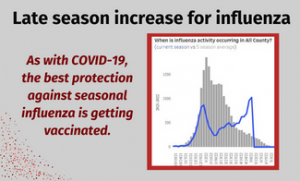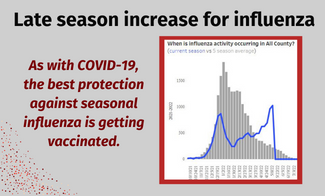 Like COVID-19 has proven to be, seasonal influenza is predictably unpredictable.
Like COVID-19 has proven to be, seasonal influenza is predictably unpredictable.
Case in point: Arizona is currently seeing increasing numbers of influenza cases much later than the five-year average shows, though overall numbers for this flu season aren’t as high as some recent seasons. Other states are seeing a similar trend.
COVID-19 and influenza share many of the same signs and symptoms. Both can result in severe illness and complications, especially for older adults, people with certain underlying medical conditions, and pregnant women. As with COVID-19, the best protection against seasonal influenza is getting vaccinated. It’s not too late to get this season’s influenza vaccine, by the way.
It’s natural to wonder why influenza is increasing so late in the season. There are multiple possible reasons, starting with the unpredictability of influenza season to season. Another factor could be a reduction in COVID-19 mitigation steps such as masks and physical distancing, which may have contributed to lower-than-usual influenza numbers last season.
In addition to getting vaccinated, here are some other things you can do to protect yourself against influenza:
- Wash your hands often with soap and water for at least 20 seconds. If soap and water are not available, use an alcohol-based hand sanitizer.
- Avoid touching your eyes, mouth, and nose with unwashed hands.
- Cover your cough or sneeze with a tissue or your sleeve, and immediately throw the tissue in the trash.
- Avoid close contact with people who are sick in your home. Keep 6 feet of distance between yourself and others outside of your home.
- Stay at home when you are sick.
To review the latest numbers and learn more about seasonal influenza, please visit azhealth.gov/flu.










